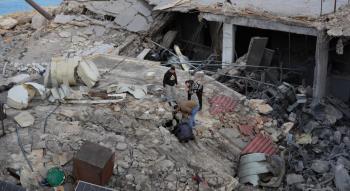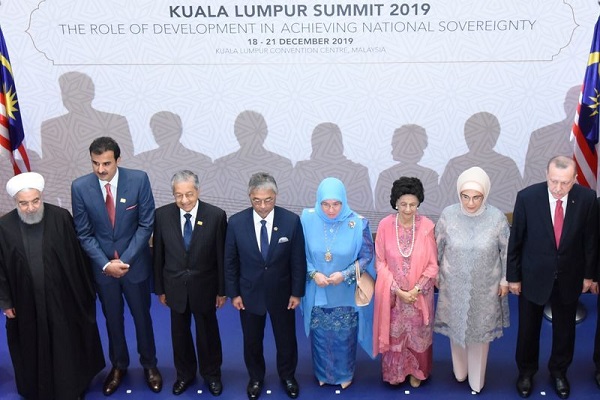Alwaght- Malaysia hosted a summit of Muslim nations on Thursday to address challenges that the Muslim world is grappling with. The Malaysian Prime Minister Mahathir Mohamad said that there were plans to establish a “group of five Muslim nations”, including Malaysia, Indonesia, Qatar, Turkey, and Pakistan for economic intentions. The G5 now rises as an important bloc in the Muslim world. But how could be its structure and what are its potentials and limitations?
G5 rising out of G8 ashes
As the Malaysian PM announced, the new bloc will not be an alternative to the Organization of Islamic Cooperation (OIC). The group should be seen as a Muslim experience similar to that of the group of eight Muslim countries, officially known as G8, which was founded in the second half of the 1990s as an initiative by Necmettin Erbakan, then Turkish PM. The bloc, proved to be an unsuccessful Muslim experience, however. It was comprised of Indonesia, Bangladesh, Pakistan, Iran, Turkey, Malaysia, Egypt, and Nigeria. It, however, changed the name to the group of eight developing countries, or D8, following a military coup that toppled Erbakan. It failed to cultivate comprehensive trade and economic partnership among the member states.
In the new conditions that are characterized by regional and international developments, the veteran Malaysian PM talks about the need to found an Islamic economic body to bring the Muslim states under the umbrella of increased cooperation. The G5 officially started work from Thursday with the presence of 450 companies, businesspeople, politicians, and Islamic figures. Still, we should wait for its results to measure the extent of coordination of the member countries.
Capacities of the G5
The most important capacity is that two members of the G20, a global block of industrial countries, are in the G5. Furthermore, only Pakistan, Turkey, and Malaysia have a population of 562 million that can provide a huge force driving inter-bloc investment and trade. Turkey as an industrial country and Malaysia as an economic power both have crucial capabilities for high-tech production. Pakistan as a nuclear power is part of this bloc. Qatar with extraordinary financial capability can provide investment for others’ manufacturing capabilities.
What are the limitations?
Despite the capacities of the G5, the members face some limitations adopting their plans. Here are some of them:
Unbalanced gross domestic product and difference in production and economic needs
From the five countries, Turkey, Indonesia, and Malaysia focus their economies on production but the economies of Qatar and Pakistan are reliant on raw material exports. According to the World Bank’s data, the GDP of the G5 states reaches to $2.66 trillion. Indonesia with $1042 billion, Turkey with $766 billion, Malaysia with $354 billion, Pakistan with $312 billion, and Qatar with $192 billion consecutively have the biggest GDP rates in the bloc. The different economy sizes and different economic goals make each of these countries move in a different direction. This, in the long run, may lead the member states into frustration with the possibility of partnership.
Unbalance in foreign trade
The total volume of the G5 with the world in 2018 was 1.42 trillion. According to the World Bank statistics, Malaysia came on top with $464.7 billion, followed by Turkey with $391 billion, and Indonesia with $369 billion. However, these countries face a set of essential issues in this course.
1. The member states should attempt to avoid trade deficit with other trade partners beside keeping the trade status quo with partners outside of the five-member bloc. This is a difficult task.
2. There is an essential challenge concerning the high-tech-related exports of the group members. Except for Malaysia, the members have mid-level performance in this regard. Malaysia alone exports worth of $90 billion high-tech products to the world while the other four together export $100 billion.
Saudi Arabia out of the bloc and struggling to fail the summit
One important issue in the process of the foundation of the G5 was absence of Saudi Arabia in the summit, which meant Riyadh was unwelcomed in the group. Saudi rulers want leadership in all Muslim world organizations and events. That is while in the G5 they not only failed to lead but also failed to be a member state. This demonstrates the shrinking position of the Arab kingdom in the Muslim world, let alone having the capability to sway the policies of other Muslim countries.
Additionally, the G5 should be regarded as a mirror of the failure of the Saudi Crown Prince Mohammed bin Salman’s economic policy of investment in East Asia, particularly in that region’s Muslim countries. In February, Saudi de facto ruler started his Asia tour and announced a huge investment in the hosting countries. But now it appears that the petrodollars have not done much to realize the crown prince’s dreams of gaining sway in that region. Therefore, Saudi Arabia should be regarded the bloc’s sworn enemy. It put strains on the Pakistani PM Imran Khan to avoid the summit. The PM canceled the trip to Malaysia as Riyadh reportedly threatened to expel about 4 million Pakistani workers, a threat revealed by Turkish President Recep Tayyip Erdogan.



























